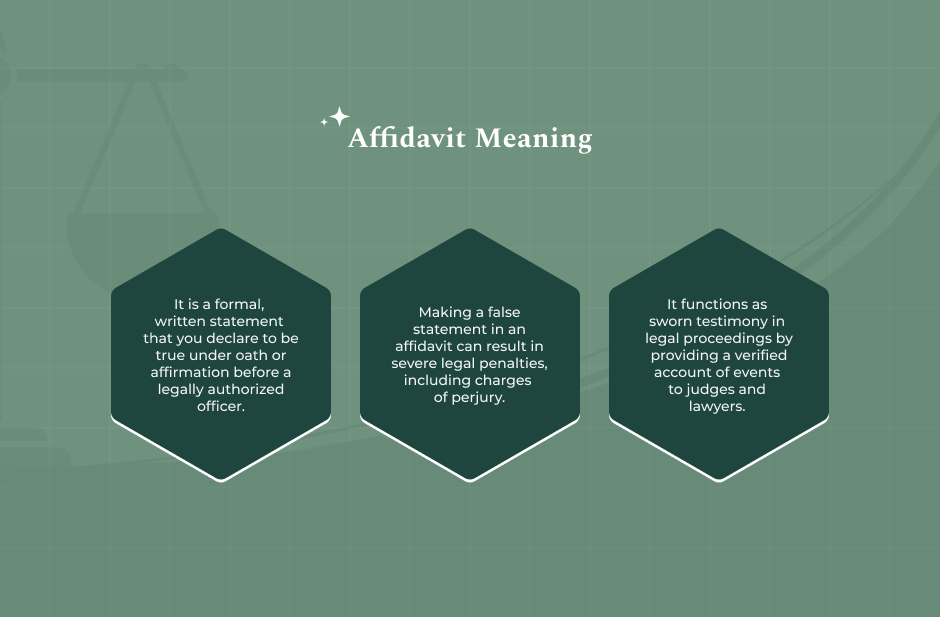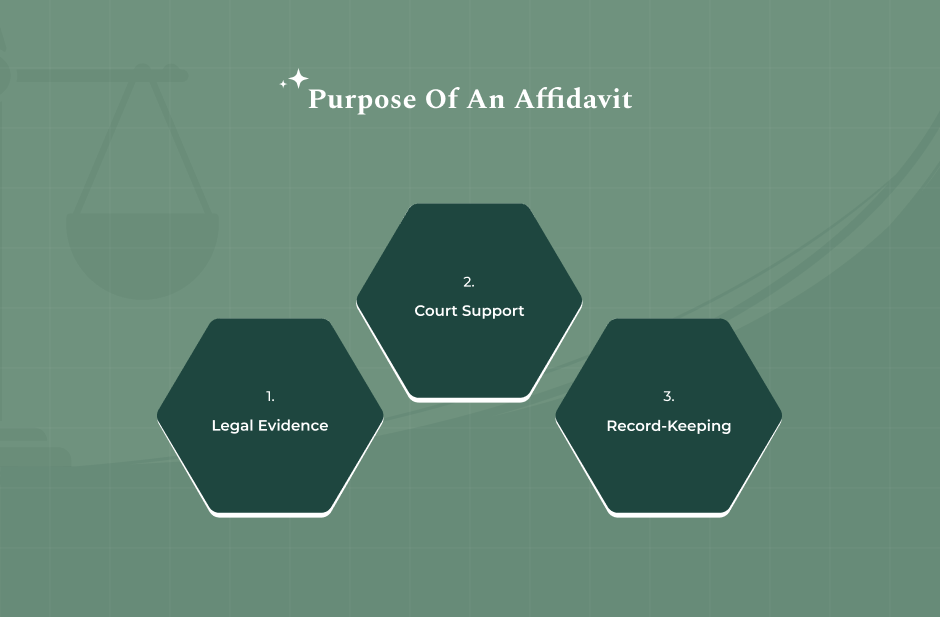An affidavit plays a vital role in legal practice. It is basically a sworn written statement that carries the weight of truth and credibility.
Irrespective of whether used in court proceedings, administrative tasks, or transactional matters, affidavits help clarify facts when live testimony isn’t feasible.
In this article, I will explain the following things:
- What is an affidavit?
- What are its types and key aspects?
- How does it work?
- What is the importance of an affidavit?
So, if these are some of the things that you want to know about, keep on reading till the end…
What Is An Affidavit?

An affidavit is a written statement made under oath. In this, the affiant swears that the information is true to the best of their knowledge, before a person authorized to administer oaths, such as a notary public or court officer. It functions much like courtroom testimony, but in written form.
According to the Legal Information Institute, in case “a witness’s testimony contradicts what they stated in their affidavit, the affidavit can be introduced as evidence to impeach that witness in accordance with Federal Rule of Evidence 607.”
Additionally, because it’s sworn under penalty of perjury, false statements can lead to legal consequences.
What Are The Types Of Affidavits?
Just like there are several types of agreements, there are different types of affidavits as well. Each of these types serves a different purpose. Some of the most common examples of affidavits are as follows:
- General Affidavit: A catch-all statement under oath, tailored for many contexts.
- Affidavit of Residence / Domicile: Certifies the affiant’s current or deceased person’s residence—used in tuition, probate, and estate cases.
- Affidavit of Marriage: Confirms marriage status, often in lieu of a certificate.
- Financial Affidavit: Discloses assets, income, and financial status—commonly used in divorce, bankruptcy, and support cases.
- Affidavit of Support: Often required in immigration cases, demonstrating financial backing.
- Affidavit of Death / Heirship / Small Estate: Used in probate to declare a person deceased or to determine heirs without a will.
- Service Affidavit: Verifies that legal documents have been delivered to the proper party.
Read Also: What Is A Small Estate Affidavit?
What Are The Key Aspects Of An Affidavit?
There are certain criteria that one must meet to make an affidavit effective. These are as follows:
- Voluntary and Competent.
- Sworn Under Oath or Affirmation.
- Notarization/Jurat.
- Explicit Format.
- Truth and Perjury.
What Is The Structure Of An Affidavit?
When writing an affidavit, the first and most important thing to consider is the format. You should format the document in the following way:
- Start with a clear title or heading.
- A description of the declarant’s oath at the top of the document.
- Statements in numbered form for easy understanding.
- Spaces for the signature of the declarant and the notary public.
These structures are the basic guidelines that all affidavits need to meet in order for the court to allow it as evidence. Any departure from these norms may lead to the affidavit being declined by the court.
How Does An Affidavit Happen?
According to Adobe, traditionally, “an affiant is the one who prepares the affidavit. Anyone who is swearing to the truth of verbal or written statements included on the affidavit can be considered an affiant.” This also means that the first step towards making an affidavit is writing it.
But then there are a few more steps that you need to include to make the legal document valid and enforceable. These steps are very easy to follow. I have mentioned them below:
- Drafting: The affiant (or their agent) composes the statement, outlining the facts and the truth. Each paragraph should be brief and focus on the facts.
- Review: The affiant goes through the document meticulously, checking every statement for truthfulness.
- Signing Before Official: The affiant signs it out of the sight of a notary or authorized official, whose identity and voluntariness are assured.
- Notarization / Jurat: The official adds the notary, together with the date and jurat, providing the seal and hence the authentication.
- Filing/Usage: The affidavit is delivered to the appropriate court, institution, or authority, etc., where it usually serves as a witness substitute if live testimony is not required.
Read Also: What Is An Acquittal: Legal Definition & Meaning
What Is The Importance Of An Affidavit?

An affidavit is essential as it embodies a legally binding, sworn, and written account of facts, typically before a notary or an official. Through this document, you can:
- Offer evidence in a court of law.
- Provide backing to statements made by you.
- Confirm the details for the purposes of administration.
- Make a record of the formalities without the requirement of a person being physically present.
When sworn by oath, any untrue statements can cause the person making them to be charged with perjury. This assists in the accuracy of the data being used and supports the holding of the integrity of legal and administrative processes.
Below are some of the instances where an affidavit is important:
- Certification of the Truth of the Matter: Affidavits have the power of being legal when under oath, and the person who made them is held accountable.
- Convenience and User-friendliness: The statements can be made even if the person who wrote the affidavit is not available in the courtroom.
- Definitely Legal: Documents such as affidavits of residence, service, or marital status, among others, are helpful in settling issues both procedural and factual promptly.
- Helps in the Prevention of Fraud & False Claim Issue: The notarization and oath are factors in the minimization of false statements and, at the same time, an assurance of the authenticity of the statement.
Read Also: When Is An Affidavit Of Non-Military Service Required?
Frequently Asked Questions (FAQs):
Here are some of the questions that people often ask when they are searching for what is an affidavit. Please take a look at them before you leave.
1. What Is The Cost Of An Affidavit?
The price of an affidavit is not specific, but is very basic. DIY affidavit may cost $10 to $20 for the document itself and notarization. However, the fees for the services differ for each state, and some states even have their own statutory limits.
2. Can I Make An Affidavit On My Own?
Only those who have attained the age of 18 years can make an affidavit on their own. They are responsible for the factual confirmation of the document. Nevertheless, you still need to ensure the correctness and adherence to the norms of the jurisdiction by seeking the help of a lawyer.
3. How Much Time Does It Take For An Affidavit?
For domestic purposes, an affidavit can be completed within several hours to a couple of days, but the time for an international attestation is 12 to 15 working days or more.
















